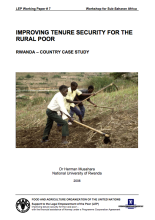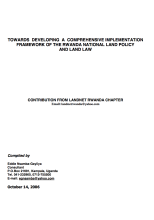/ library resources
Showing items 1 through 9 of 13.Most of the world’s poor work in the “informal economy” – outside of recognized and enforceable rules.
Thus, even though most have assets of some kind, they have no way to document their possessions
This paper contains a preliminary summary of key issues and findings from a desk review of
the literature on land titling projects and programmes in urban and peri-urban areas of
developing countries. It draws on a large number of documents, not all of which have been
In Rwanda, two factors make land a highly important and contested issue. First,
Rwanda has the highest person-to-land ratio in Africa. This creates tremendous
pressure on land in a country where most of the population lives in rural areas, and
Many authors contend that ethnic extremism coupled with political manipulation were the primary factors behind the Rwandan genocide. Yet, to oversimplify the cause of this tragedy makes one blind to the complicated nexus that generated the outcome.
Presidential Order N° 53/01 of 12/10/ 2006 Determining Structure, Powers and Functioning of Office of the Registrar of Land Titles.
Published on the 17 October 2006.
Presidential Order N° 54/01 of 12th October 2006 Determining Structure, Responsibilities, Functioning and Composition of Land Commissions.
Published on the 17 October 2006.
Prime Minister’s Order N° 17/03 of 9 October 2006 Establishing the Task Force in Charge of Land Reform and Management in Rwanda.
Published on the 17 October 2006.
The paper is a product of a short term consultancy work offered by Food and Agriculture Organization of the United Nations (FAO) for the Ministry of Lands, Environment Forestry, Water and Mines of Rwanda.
Examines critical land issues and land related problems; the National Land Policy in the context of the national development agenda; global experiences and best practices in land reforms and implementing land policies, especially in post-conflict situations; implementation challenges; towards dev
Pagination
Land Library Search
Through our robust search engine, you can search for any item of the over 73,000 highly curated resources in the Land Library.
If you would like to find an overview of what is possible, feel free to peruse the Search Guide.







